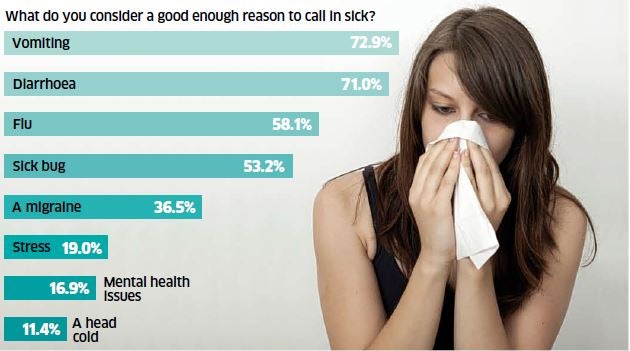The most acceptable reasons to take a sick day revealed
Study of employers and employees shows vomiting and diarrhoea get far more sympathy than depression

Your support helps us to tell the story
From reproductive rights to climate change to Big Tech, The Independent is on the ground when the story is developing. Whether it's investigating the financials of Elon Musk's pro-Trump PAC or producing our latest documentary, 'The A Word', which shines a light on the American women fighting for reproductive rights, we know how important it is to parse out the facts from the messaging.
At such a critical moment in US history, we need reporters on the ground. Your donation allows us to keep sending journalists to speak to both sides of the story.
The Independent is trusted by Americans across the entire political spectrum. And unlike many other quality news outlets, we choose not to lock Americans out of our reporting and analysis with paywalls. We believe quality journalism should be available to everyone, paid for by those who can afford it.
Your support makes all the difference.We all know that feeling: you’ve woken up on a Monday morning with an unbearable cold or splitting headache, and the thought of a day in the office is too much to bear. Time to email the boss and explain why you won’t be coming in today.
But not all excuses for pulling a sickie are equal, it seems. A new study of 2,500 employers and employees across the UK has revealed that vomiting is (understandably, perhaps) considered the most acceptable reason to take the day off, with 73 per cent of respondents saying it would make them retreat beneath the duvet. Diarrhoea came a close second, with 71 per cent indicating they would rather not chance the journey to work.
But feeling stressed or depressed seems to earn far less sympathy, both from workers and from bosses. The study suggests you might just be expected to grin and bear it. Only 17 per cent thought mental health issues were a valid reason for sick leave – only slightly more than the percentage who would call in sick only if they had to go to hospital.
Inji Duducu, director of healthcare provider Benenden, which conducted the study, believes the statistics highlight problems in the way mental health is perceived at work.

“There seems to be a clear lack of understanding from some employers in terms of employee well-being,” she said. “There is a strong commercial case for having a healthy and engaged workforce, yet employers are evidently ignoring the impact of an employee’s physical and mental well-being on productivity, absenteeism and [length of service].”
The highest rates of absenteeism were among women aged 18 to 24 living in Edinburgh and working in the utilities sector – waste treatment, sanitation or supply of gas, electricity and water.
The survey also suggests that older employees are less inclined to take a day off than their younger colleagues. The statistics show that 63 per cent of people over 50 haven’t taken a day off this year, nearly twice the figure for those aged 18 to 24.
And despite the notorious “man flu”, men are less likely to call in sick than women. But when they do, they’re more likely to say it’s because they are feeling tired, under the weather or hung-over. Perhaps some early nights are in order.
Join our commenting forum
Join thought-provoking conversations, follow other Independent readers and see their replies
Comments